Dementia Care: Types, Effects, Legislation, and Roles of Care Workers
VerifiedAdded on 2022/12/29
|11
|3572
|28
AI Summary
This document provides an overview of different types of dementia, including vascular dementia, Alzheimer's dementia, and frontotemporal lobe dementia. It describes the common signs and symptoms of each type and outlines the possible effects of dementia on the health and quality of life of individuals. The document also discusses the legislation and frameworks that govern work with people with dementia, such as the Human Rights Act, Data Protection Act, and Mental Capacity Act. Additionally, it explains the roles and responsibilities of health and social care workers in improving the health and quality of life of people with dementia, including continuity of care, medication management, and assistance with meals and nutrition.
Contribute Materials
Your contribution can guide someone’s learning journey. Share your
documents today.
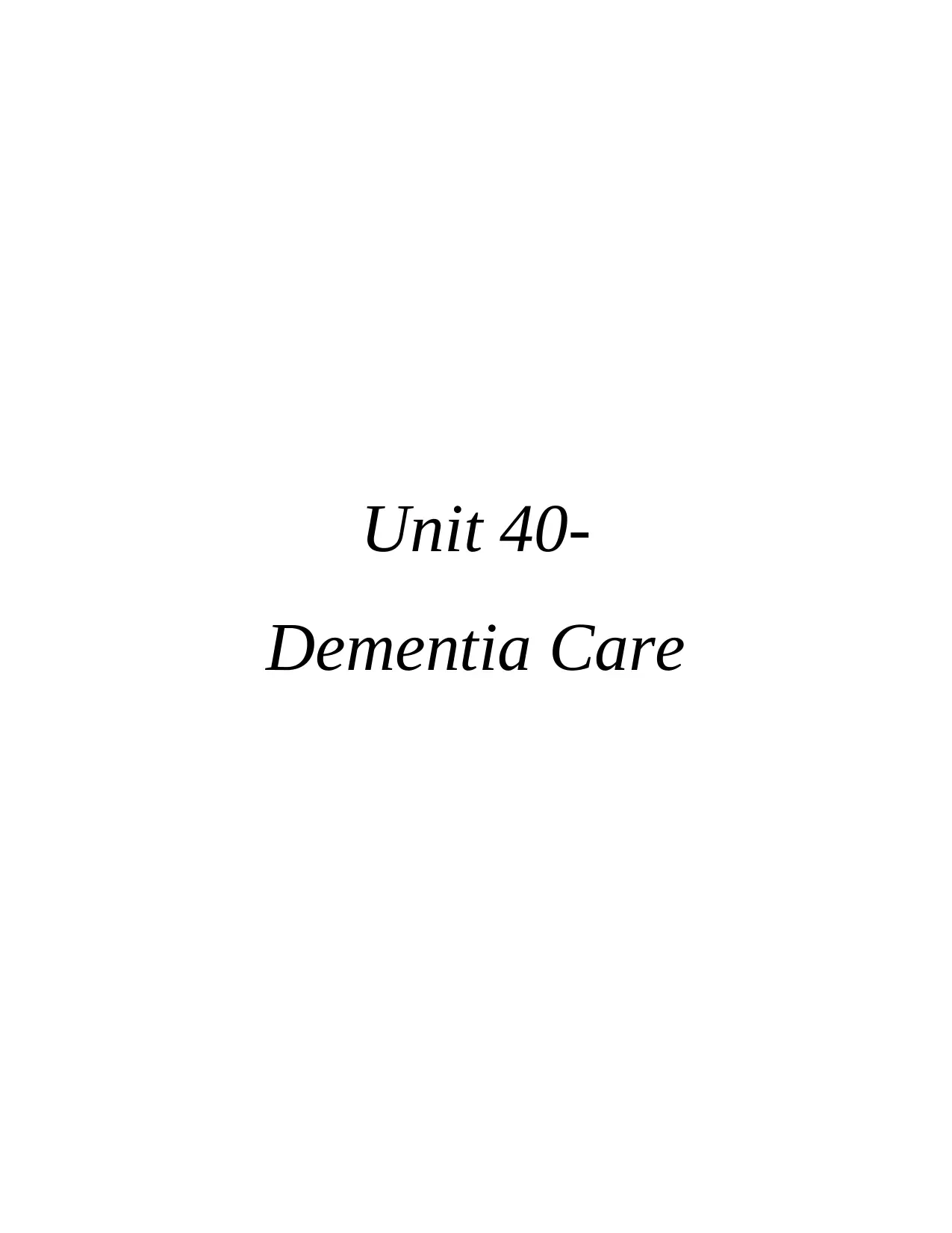
Unit 40-
Dementia Care
Dementia Care
Secure Best Marks with AI Grader
Need help grading? Try our AI Grader for instant feedback on your assignments.
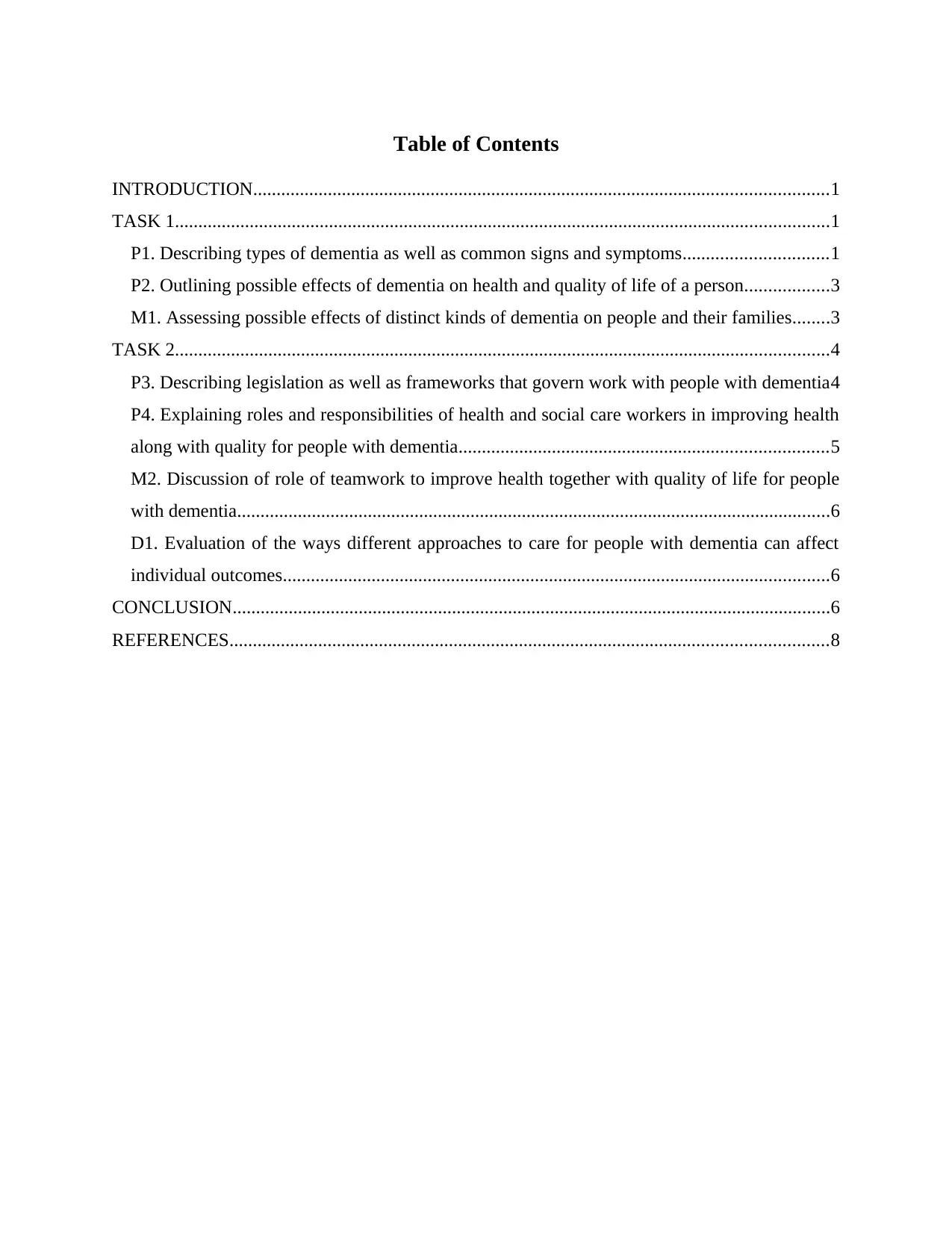
Table of Contents
INTRODUCTION...........................................................................................................................1
TASK 1............................................................................................................................................1
P1. Describing types of dementia as well as common signs and symptoms...............................1
P2. Outlining possible effects of dementia on health and quality of life of a person..................3
M1. Assessing possible effects of distinct kinds of dementia on people and their families........3
TASK 2............................................................................................................................................4
P3. Describing legislation as well as frameworks that govern work with people with dementia4
P4. Explaining roles and responsibilities of health and social care workers in improving health
along with quality for people with dementia...............................................................................5
M2. Discussion of role of teamwork to improve health together with quality of life for people
with dementia...............................................................................................................................6
D1. Evaluation of the ways different approaches to care for people with dementia can affect
individual outcomes.....................................................................................................................6
CONCLUSION................................................................................................................................6
REFERENCES................................................................................................................................8
INTRODUCTION...........................................................................................................................1
TASK 1............................................................................................................................................1
P1. Describing types of dementia as well as common signs and symptoms...............................1
P2. Outlining possible effects of dementia on health and quality of life of a person..................3
M1. Assessing possible effects of distinct kinds of dementia on people and their families........3
TASK 2............................................................................................................................................4
P3. Describing legislation as well as frameworks that govern work with people with dementia4
P4. Explaining roles and responsibilities of health and social care workers in improving health
along with quality for people with dementia...............................................................................5
M2. Discussion of role of teamwork to improve health together with quality of life for people
with dementia...............................................................................................................................6
D1. Evaluation of the ways different approaches to care for people with dementia can affect
individual outcomes.....................................................................................................................6
CONCLUSION................................................................................................................................6
REFERENCES................................................................................................................................8

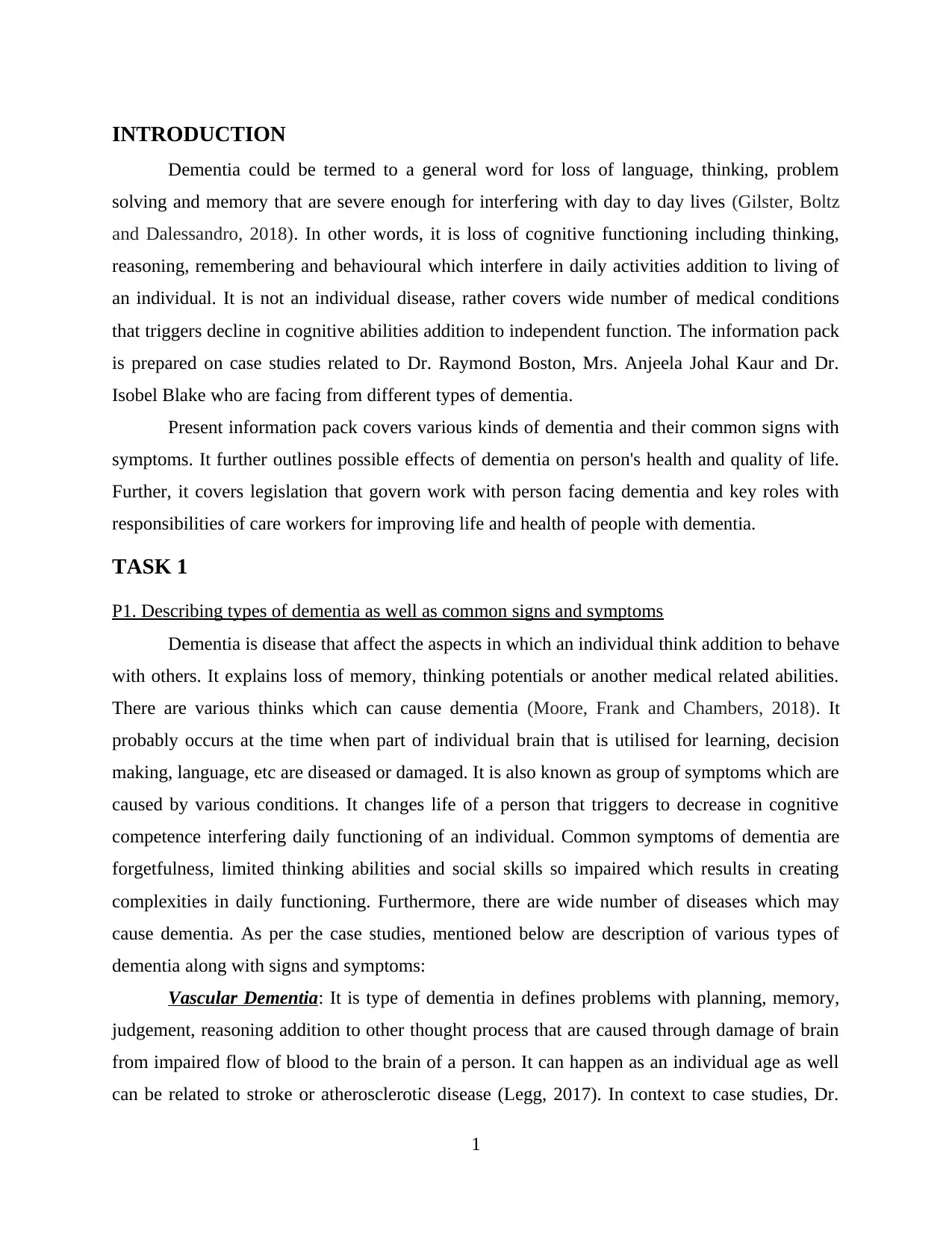
INTRODUCTION
Dementia could be termed to a general word for loss of language, thinking, problem
solving and memory that are severe enough for interfering with day to day lives (Gilster, Boltz
and Dalessandro, 2018). In other words, it is loss of cognitive functioning including thinking,
reasoning, remembering and behavioural which interfere in daily activities addition to living of
an individual. It is not an individual disease, rather covers wide number of medical conditions
that triggers decline in cognitive abilities addition to independent function. The information pack
is prepared on case studies related to Dr. Raymond Boston, Mrs. Anjeela Johal Kaur and Dr.
Isobel Blake who are facing from different types of dementia.
Present information pack covers various kinds of dementia and their common signs with
symptoms. It further outlines possible effects of dementia on person's health and quality of life.
Further, it covers legislation that govern work with person facing dementia and key roles with
responsibilities of care workers for improving life and health of people with dementia.
TASK 1
P1. Describing types of dementia as well as common signs and symptoms
Dementia is disease that affect the aspects in which an individual think addition to behave
with others. It explains loss of memory, thinking potentials or another medical related abilities.
There are various thinks which can cause dementia (Moore, Frank and Chambers, 2018). It
probably occurs at the time when part of individual brain that is utilised for learning, decision
making, language, etc are diseased or damaged. It is also known as group of symptoms which are
caused by various conditions. It changes life of a person that triggers to decrease in cognitive
competence interfering daily functioning of an individual. Common symptoms of dementia are
forgetfulness, limited thinking abilities and social skills so impaired which results in creating
complexities in daily functioning. Furthermore, there are wide number of diseases which may
cause dementia. As per the case studies, mentioned below are description of various types of
dementia along with signs and symptoms:
Vascular Dementia: It is type of dementia in defines problems with planning, memory,
judgement, reasoning addition to other thought process that are caused through damage of brain
from impaired flow of blood to the brain of a person. It can happen as an individual age as well
can be related to stroke or atherosclerotic disease (Legg, 2017). In context to case studies, Dr.
1
Dementia could be termed to a general word for loss of language, thinking, problem
solving and memory that are severe enough for interfering with day to day lives (Gilster, Boltz
and Dalessandro, 2018). In other words, it is loss of cognitive functioning including thinking,
reasoning, remembering and behavioural which interfere in daily activities addition to living of
an individual. It is not an individual disease, rather covers wide number of medical conditions
that triggers decline in cognitive abilities addition to independent function. The information pack
is prepared on case studies related to Dr. Raymond Boston, Mrs. Anjeela Johal Kaur and Dr.
Isobel Blake who are facing from different types of dementia.
Present information pack covers various kinds of dementia and their common signs with
symptoms. It further outlines possible effects of dementia on person's health and quality of life.
Further, it covers legislation that govern work with person facing dementia and key roles with
responsibilities of care workers for improving life and health of people with dementia.
TASK 1
P1. Describing types of dementia as well as common signs and symptoms
Dementia is disease that affect the aspects in which an individual think addition to behave
with others. It explains loss of memory, thinking potentials or another medical related abilities.
There are various thinks which can cause dementia (Moore, Frank and Chambers, 2018). It
probably occurs at the time when part of individual brain that is utilised for learning, decision
making, language, etc are diseased or damaged. It is also known as group of symptoms which are
caused by various conditions. It changes life of a person that triggers to decrease in cognitive
competence interfering daily functioning of an individual. Common symptoms of dementia are
forgetfulness, limited thinking abilities and social skills so impaired which results in creating
complexities in daily functioning. Furthermore, there are wide number of diseases which may
cause dementia. As per the case studies, mentioned below are description of various types of
dementia along with signs and symptoms:
Vascular Dementia: It is type of dementia in defines problems with planning, memory,
judgement, reasoning addition to other thought process that are caused through damage of brain
from impaired flow of blood to the brain of a person. It can happen as an individual age as well
can be related to stroke or atherosclerotic disease (Legg, 2017). In context to case studies, Dr.
1
Secure Best Marks with AI Grader
Need help grading? Try our AI Grader for instant feedback on your assignments.
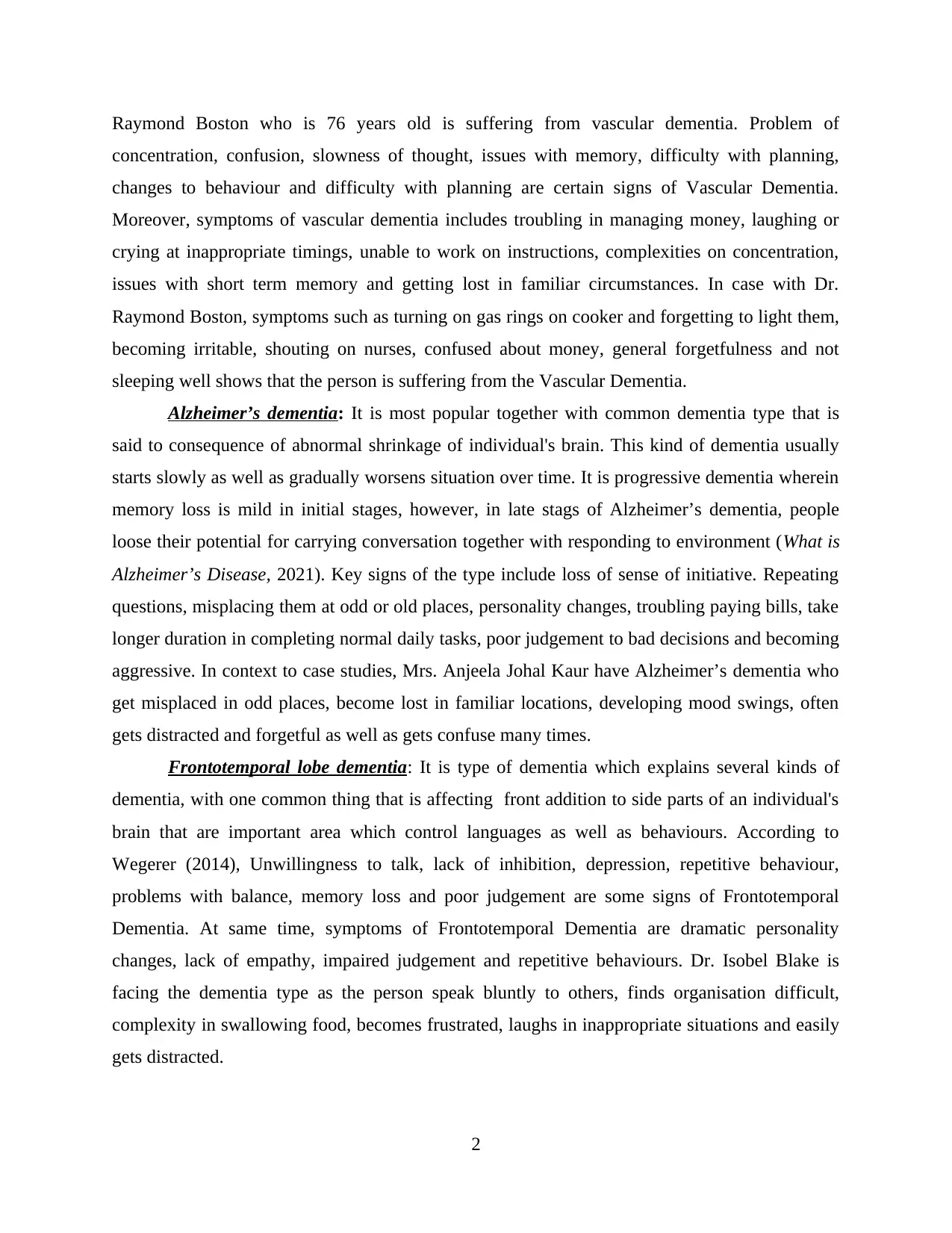
Raymond Boston who is 76 years old is suffering from vascular dementia. Problem of
concentration, confusion, slowness of thought, issues with memory, difficulty with planning,
changes to behaviour and difficulty with planning are certain signs of Vascular Dementia.
Moreover, symptoms of vascular dementia includes troubling in managing money, laughing or
crying at inappropriate timings, unable to work on instructions, complexities on concentration,
issues with short term memory and getting lost in familiar circumstances. In case with Dr.
Raymond Boston, symptoms such as turning on gas rings on cooker and forgetting to light them,
becoming irritable, shouting on nurses, confused about money, general forgetfulness and not
sleeping well shows that the person is suffering from the Vascular Dementia.
Alzheimer’s dementia: It is most popular together with common dementia type that is
said to consequence of abnormal shrinkage of individual's brain. This kind of dementia usually
starts slowly as well as gradually worsens situation over time. It is progressive dementia wherein
memory loss is mild in initial stages, however, in late stags of Alzheimer’s dementia, people
loose their potential for carrying conversation together with responding to environment (What is
Alzheimer’s Disease, 2021). Key signs of the type include loss of sense of initiative. Repeating
questions, misplacing them at odd or old places, personality changes, troubling paying bills, take
longer duration in completing normal daily tasks, poor judgement to bad decisions and becoming
aggressive. In context to case studies, Mrs. Anjeela Johal Kaur have Alzheimer’s dementia who
get misplaced in odd places, become lost in familiar locations, developing mood swings, often
gets distracted and forgetful as well as gets confuse many times.
Frontotemporal lobe dementia: It is type of dementia which explains several kinds of
dementia, with one common thing that is affecting front addition to side parts of an individual's
brain that are important area which control languages as well as behaviours. According to
Wegerer (2014), Unwillingness to talk, lack of inhibition, depression, repetitive behaviour,
problems with balance, memory loss and poor judgement are some signs of Frontotemporal
Dementia. At same time, symptoms of Frontotemporal Dementia are dramatic personality
changes, lack of empathy, impaired judgement and repetitive behaviours. Dr. Isobel Blake is
facing the dementia type as the person speak bluntly to others, finds organisation difficult,
complexity in swallowing food, becomes frustrated, laughs in inappropriate situations and easily
gets distracted.
2
concentration, confusion, slowness of thought, issues with memory, difficulty with planning,
changes to behaviour and difficulty with planning are certain signs of Vascular Dementia.
Moreover, symptoms of vascular dementia includes troubling in managing money, laughing or
crying at inappropriate timings, unable to work on instructions, complexities on concentration,
issues with short term memory and getting lost in familiar circumstances. In case with Dr.
Raymond Boston, symptoms such as turning on gas rings on cooker and forgetting to light them,
becoming irritable, shouting on nurses, confused about money, general forgetfulness and not
sleeping well shows that the person is suffering from the Vascular Dementia.
Alzheimer’s dementia: It is most popular together with common dementia type that is
said to consequence of abnormal shrinkage of individual's brain. This kind of dementia usually
starts slowly as well as gradually worsens situation over time. It is progressive dementia wherein
memory loss is mild in initial stages, however, in late stags of Alzheimer’s dementia, people
loose their potential for carrying conversation together with responding to environment (What is
Alzheimer’s Disease, 2021). Key signs of the type include loss of sense of initiative. Repeating
questions, misplacing them at odd or old places, personality changes, troubling paying bills, take
longer duration in completing normal daily tasks, poor judgement to bad decisions and becoming
aggressive. In context to case studies, Mrs. Anjeela Johal Kaur have Alzheimer’s dementia who
get misplaced in odd places, become lost in familiar locations, developing mood swings, often
gets distracted and forgetful as well as gets confuse many times.
Frontotemporal lobe dementia: It is type of dementia which explains several kinds of
dementia, with one common thing that is affecting front addition to side parts of an individual's
brain that are important area which control languages as well as behaviours. According to
Wegerer (2014), Unwillingness to talk, lack of inhibition, depression, repetitive behaviour,
problems with balance, memory loss and poor judgement are some signs of Frontotemporal
Dementia. At same time, symptoms of Frontotemporal Dementia are dramatic personality
changes, lack of empathy, impaired judgement and repetitive behaviours. Dr. Isobel Blake is
facing the dementia type as the person speak bluntly to others, finds organisation difficult,
complexity in swallowing food, becomes frustrated, laughs in inappropriate situations and easily
gets distracted.
2
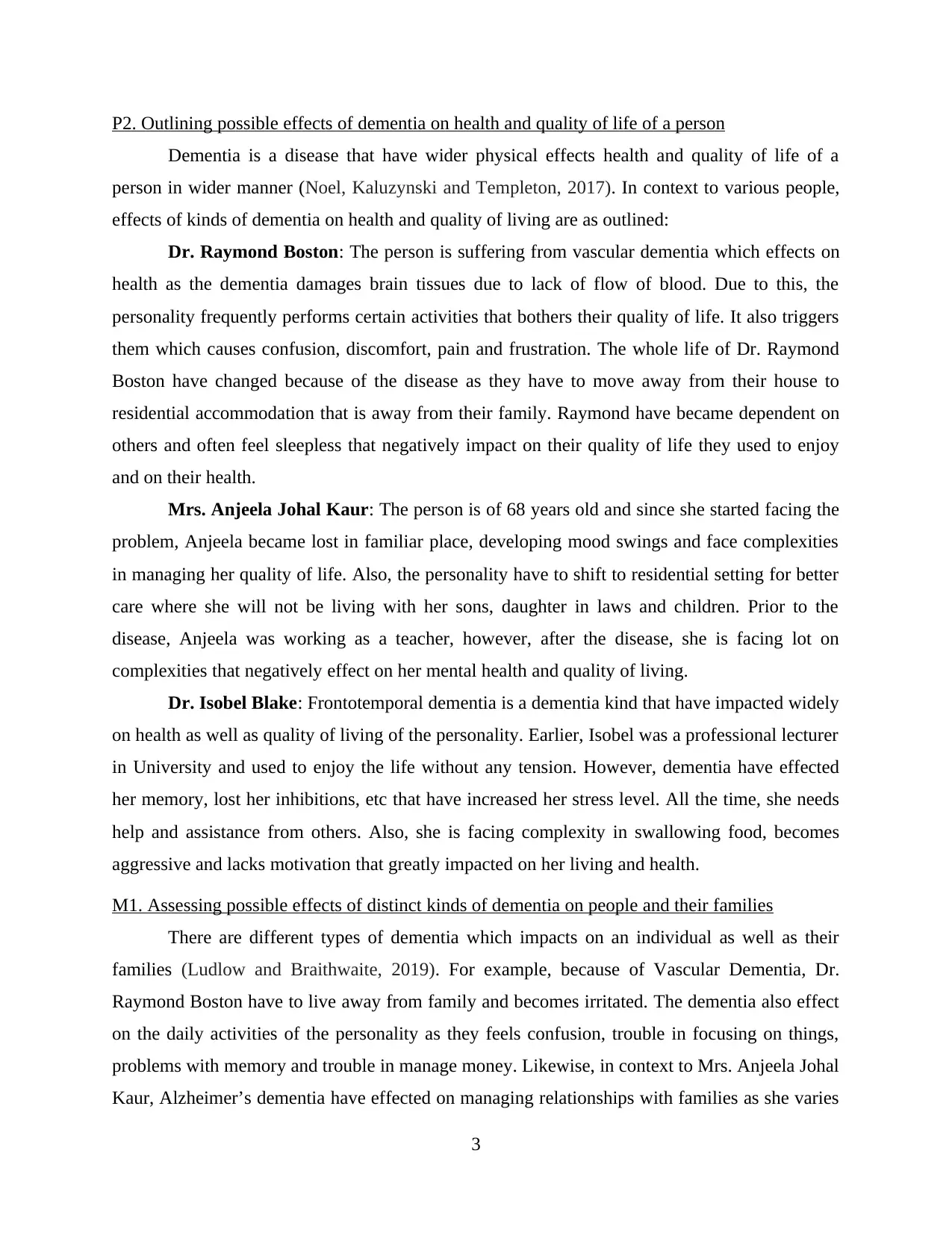
P2. Outlining possible effects of dementia on health and quality of life of a person
Dementia is a disease that have wider physical effects health and quality of life of a
person in wider manner (Noel, Kaluzynski and Templeton, 2017). In context to various people,
effects of kinds of dementia on health and quality of living are as outlined:
Dr. Raymond Boston: The person is suffering from vascular dementia which effects on
health as the dementia damages brain tissues due to lack of flow of blood. Due to this, the
personality frequently performs certain activities that bothers their quality of life. It also triggers
them which causes confusion, discomfort, pain and frustration. The whole life of Dr. Raymond
Boston have changed because of the disease as they have to move away from their house to
residential accommodation that is away from their family. Raymond have became dependent on
others and often feel sleepless that negatively impact on their quality of life they used to enjoy
and on their health.
Mrs. Anjeela Johal Kaur: The person is of 68 years old and since she started facing the
problem, Anjeela became lost in familiar place, developing mood swings and face complexities
in managing her quality of life. Also, the personality have to shift to residential setting for better
care where she will not be living with her sons, daughter in laws and children. Prior to the
disease, Anjeela was working as a teacher, however, after the disease, she is facing lot on
complexities that negatively effect on her mental health and quality of living.
Dr. Isobel Blake: Frontotemporal dementia is a dementia kind that have impacted widely
on health as well as quality of living of the personality. Earlier, Isobel was a professional lecturer
in University and used to enjoy the life without any tension. However, dementia have effected
her memory, lost her inhibitions, etc that have increased her stress level. All the time, she needs
help and assistance from others. Also, she is facing complexity in swallowing food, becomes
aggressive and lacks motivation that greatly impacted on her living and health.
M1. Assessing possible effects of distinct kinds of dementia on people and their families
There are different types of dementia which impacts on an individual as well as their
families (Ludlow and Braithwaite, 2019). For example, because of Vascular Dementia, Dr.
Raymond Boston have to live away from family and becomes irritated. The dementia also effect
on the daily activities of the personality as they feels confusion, trouble in focusing on things,
problems with memory and trouble in manage money. Likewise, in context to Mrs. Anjeela Johal
Kaur, Alzheimer’s dementia have effected on managing relationships with families as she varies
3
Dementia is a disease that have wider physical effects health and quality of life of a
person in wider manner (Noel, Kaluzynski and Templeton, 2017). In context to various people,
effects of kinds of dementia on health and quality of living are as outlined:
Dr. Raymond Boston: The person is suffering from vascular dementia which effects on
health as the dementia damages brain tissues due to lack of flow of blood. Due to this, the
personality frequently performs certain activities that bothers their quality of life. It also triggers
them which causes confusion, discomfort, pain and frustration. The whole life of Dr. Raymond
Boston have changed because of the disease as they have to move away from their house to
residential accommodation that is away from their family. Raymond have became dependent on
others and often feel sleepless that negatively impact on their quality of life they used to enjoy
and on their health.
Mrs. Anjeela Johal Kaur: The person is of 68 years old and since she started facing the
problem, Anjeela became lost in familiar place, developing mood swings and face complexities
in managing her quality of life. Also, the personality have to shift to residential setting for better
care where she will not be living with her sons, daughter in laws and children. Prior to the
disease, Anjeela was working as a teacher, however, after the disease, she is facing lot on
complexities that negatively effect on her mental health and quality of living.
Dr. Isobel Blake: Frontotemporal dementia is a dementia kind that have impacted widely
on health as well as quality of living of the personality. Earlier, Isobel was a professional lecturer
in University and used to enjoy the life without any tension. However, dementia have effected
her memory, lost her inhibitions, etc that have increased her stress level. All the time, she needs
help and assistance from others. Also, she is facing complexity in swallowing food, becomes
aggressive and lacks motivation that greatly impacted on her living and health.
M1. Assessing possible effects of distinct kinds of dementia on people and their families
There are different types of dementia which impacts on an individual as well as their
families (Ludlow and Braithwaite, 2019). For example, because of Vascular Dementia, Dr.
Raymond Boston have to live away from family and becomes irritated. The dementia also effect
on the daily activities of the personality as they feels confusion, trouble in focusing on things,
problems with memory and trouble in manage money. Likewise, in context to Mrs. Anjeela Johal
Kaur, Alzheimer’s dementia have effected on managing relationships with families as she varies
3
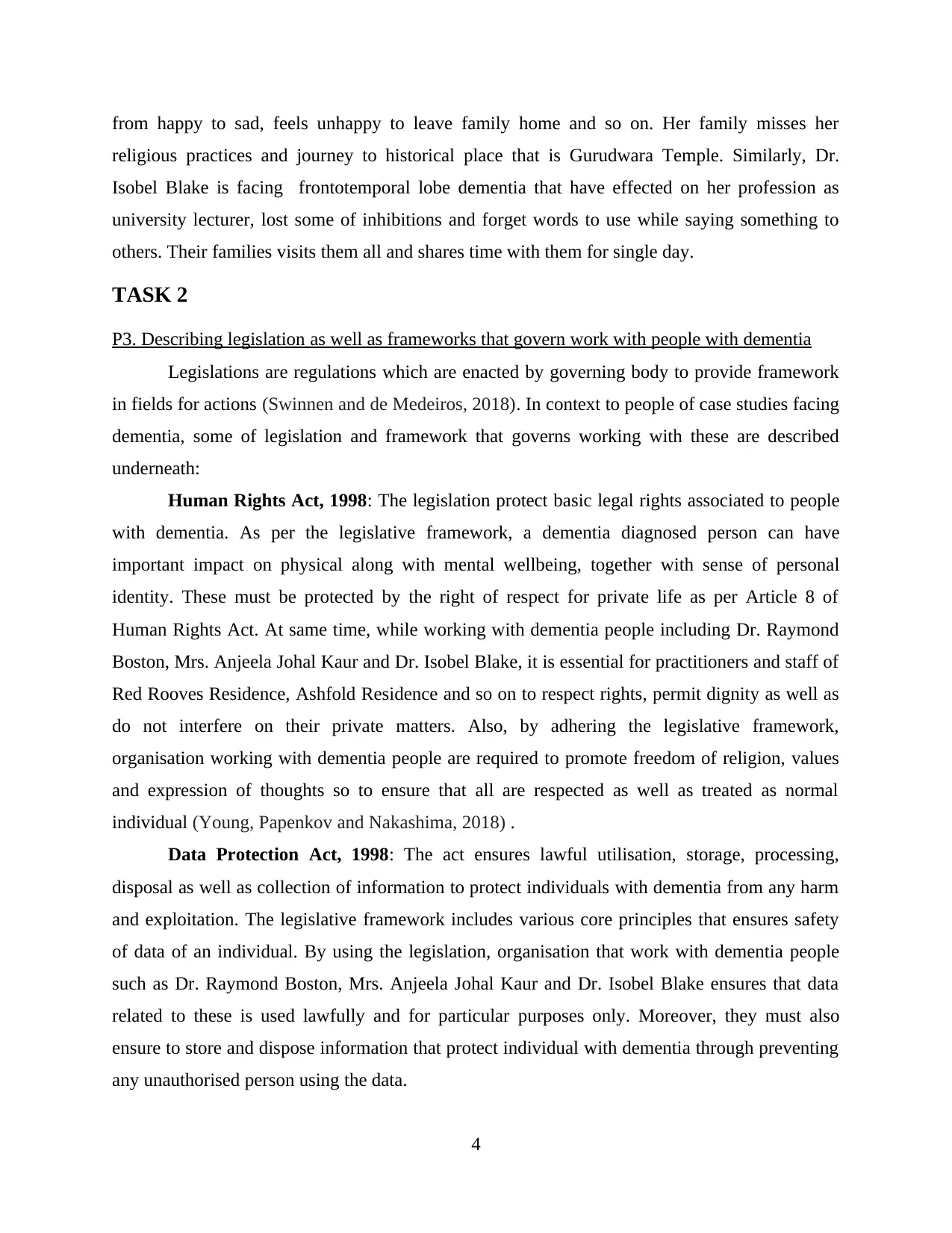
from happy to sad, feels unhappy to leave family home and so on. Her family misses her
religious practices and journey to historical place that is Gurudwara Temple. Similarly, Dr.
Isobel Blake is facing frontotemporal lobe dementia that have effected on her profession as
university lecturer, lost some of inhibitions and forget words to use while saying something to
others. Their families visits them all and shares time with them for single day.
TASK 2
P3. Describing legislation as well as frameworks that govern work with people with dementia
Legislations are regulations which are enacted by governing body to provide framework
in fields for actions (Swinnen and de Medeiros, 2018). In context to people of case studies facing
dementia, some of legislation and framework that governs working with these are described
underneath:
Human Rights Act, 1998: The legislation protect basic legal rights associated to people
with dementia. As per the legislative framework, a dementia diagnosed person can have
important impact on physical along with mental wellbeing, together with sense of personal
identity. These must be protected by the right of respect for private life as per Article 8 of
Human Rights Act. At same time, while working with dementia people including Dr. Raymond
Boston, Mrs. Anjeela Johal Kaur and Dr. Isobel Blake, it is essential for practitioners and staff of
Red Rooves Residence, Ashfold Residence and so on to respect rights, permit dignity as well as
do not interfere on their private matters. Also, by adhering the legislative framework,
organisation working with dementia people are required to promote freedom of religion, values
and expression of thoughts so to ensure that all are respected as well as treated as normal
individual (Young, Papenkov and Nakashima, 2018) .
Data Protection Act, 1998: The act ensures lawful utilisation, storage, processing,
disposal as well as collection of information to protect individuals with dementia from any harm
and exploitation. The legislative framework includes various core principles that ensures safety
of data of an individual. By using the legislation, organisation that work with dementia people
such as Dr. Raymond Boston, Mrs. Anjeela Johal Kaur and Dr. Isobel Blake ensures that data
related to these is used lawfully and for particular purposes only. Moreover, they must also
ensure to store and dispose information that protect individual with dementia through preventing
any unauthorised person using the data.
4
religious practices and journey to historical place that is Gurudwara Temple. Similarly, Dr.
Isobel Blake is facing frontotemporal lobe dementia that have effected on her profession as
university lecturer, lost some of inhibitions and forget words to use while saying something to
others. Their families visits them all and shares time with them for single day.
TASK 2
P3. Describing legislation as well as frameworks that govern work with people with dementia
Legislations are regulations which are enacted by governing body to provide framework
in fields for actions (Swinnen and de Medeiros, 2018). In context to people of case studies facing
dementia, some of legislation and framework that governs working with these are described
underneath:
Human Rights Act, 1998: The legislation protect basic legal rights associated to people
with dementia. As per the legislative framework, a dementia diagnosed person can have
important impact on physical along with mental wellbeing, together with sense of personal
identity. These must be protected by the right of respect for private life as per Article 8 of
Human Rights Act. At same time, while working with dementia people including Dr. Raymond
Boston, Mrs. Anjeela Johal Kaur and Dr. Isobel Blake, it is essential for practitioners and staff of
Red Rooves Residence, Ashfold Residence and so on to respect rights, permit dignity as well as
do not interfere on their private matters. Also, by adhering the legislative framework,
organisation working with dementia people are required to promote freedom of religion, values
and expression of thoughts so to ensure that all are respected as well as treated as normal
individual (Young, Papenkov and Nakashima, 2018) .
Data Protection Act, 1998: The act ensures lawful utilisation, storage, processing,
disposal as well as collection of information to protect individuals with dementia from any harm
and exploitation. The legislative framework includes various core principles that ensures safety
of data of an individual. By using the legislation, organisation that work with dementia people
such as Dr. Raymond Boston, Mrs. Anjeela Johal Kaur and Dr. Isobel Blake ensures that data
related to these is used lawfully and for particular purposes only. Moreover, they must also
ensure to store and dispose information that protect individual with dementia through preventing
any unauthorised person using the data.
4
Paraphrase This Document
Need a fresh take? Get an instant paraphrase of this document with our AI Paraphraser
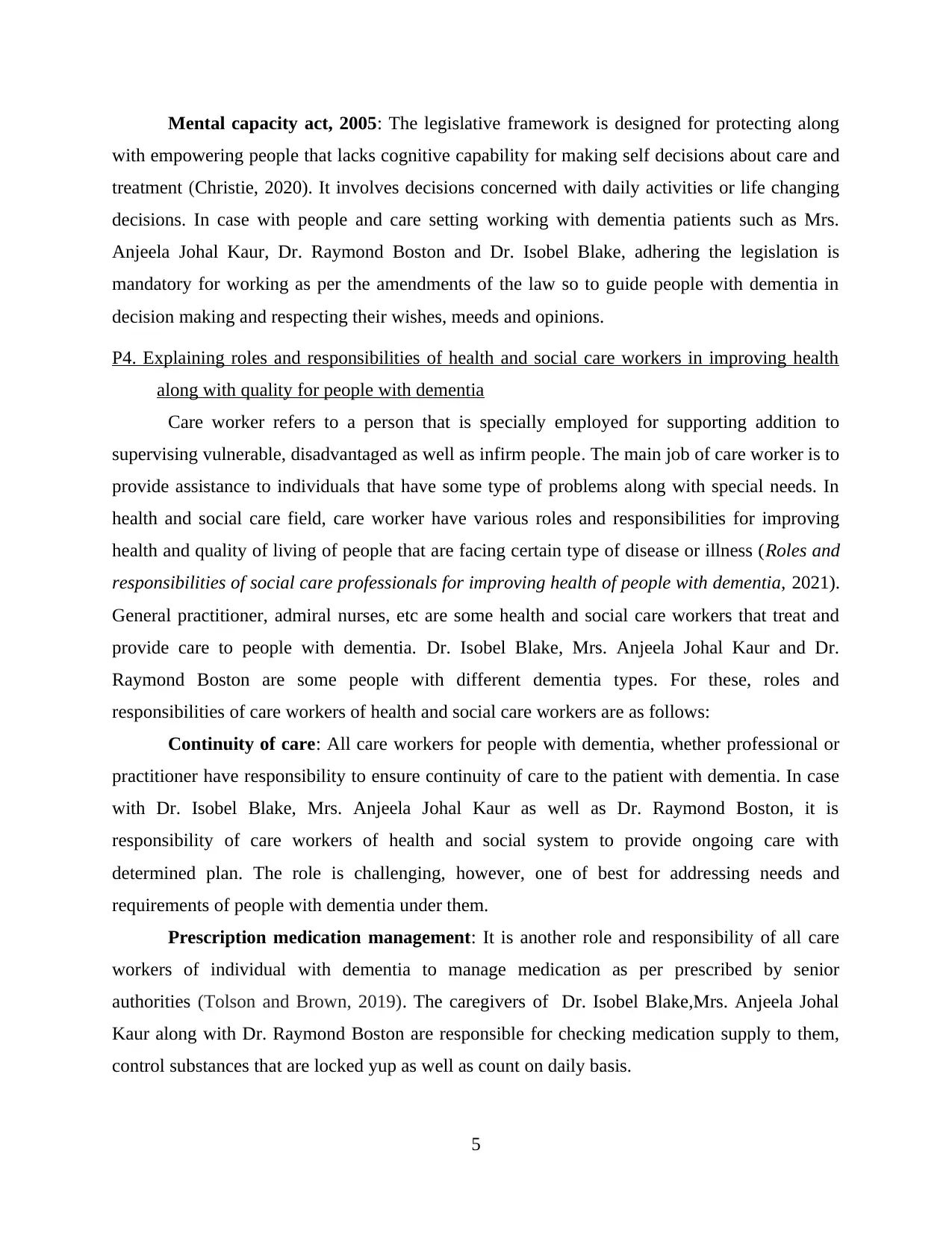
Mental capacity act, 2005: The legislative framework is designed for protecting along
with empowering people that lacks cognitive capability for making self decisions about care and
treatment (Christie, 2020). It involves decisions concerned with daily activities or life changing
decisions. In case with people and care setting working with dementia patients such as Mrs.
Anjeela Johal Kaur, Dr. Raymond Boston and Dr. Isobel Blake, adhering the legislation is
mandatory for working as per the amendments of the law so to guide people with dementia in
decision making and respecting their wishes, meeds and opinions.
P4. Explaining roles and responsibilities of health and social care workers in improving health
along with quality for people with dementia
Care worker refers to a person that is specially employed for supporting addition to
supervising vulnerable, disadvantaged as well as infirm people. The main job of care worker is to
provide assistance to individuals that have some type of problems along with special needs. In
health and social care field, care worker have various roles and responsibilities for improving
health and quality of living of people that are facing certain type of disease or illness (Roles and
responsibilities of social care professionals for improving health of people with dementia, 2021).
General practitioner, admiral nurses, etc are some health and social care workers that treat and
provide care to people with dementia. Dr. Isobel Blake, Mrs. Anjeela Johal Kaur and Dr.
Raymond Boston are some people with different dementia types. For these, roles and
responsibilities of care workers of health and social care workers are as follows:
Continuity of care: All care workers for people with dementia, whether professional or
practitioner have responsibility to ensure continuity of care to the patient with dementia. In case
with Dr. Isobel Blake, Mrs. Anjeela Johal Kaur as well as Dr. Raymond Boston, it is
responsibility of care workers of health and social system to provide ongoing care with
determined plan. The role is challenging, however, one of best for addressing needs and
requirements of people with dementia under them.
Prescription medication management: It is another role and responsibility of all care
workers of individual with dementia to manage medication as per prescribed by senior
authorities (Tolson and Brown, 2019). The caregivers of Dr. Isobel Blake,Mrs. Anjeela Johal
Kaur along with Dr. Raymond Boston are responsible for checking medication supply to them,
control substances that are locked yup as well as count on daily basis.
5
with empowering people that lacks cognitive capability for making self decisions about care and
treatment (Christie, 2020). It involves decisions concerned with daily activities or life changing
decisions. In case with people and care setting working with dementia patients such as Mrs.
Anjeela Johal Kaur, Dr. Raymond Boston and Dr. Isobel Blake, adhering the legislation is
mandatory for working as per the amendments of the law so to guide people with dementia in
decision making and respecting their wishes, meeds and opinions.
P4. Explaining roles and responsibilities of health and social care workers in improving health
along with quality for people with dementia
Care worker refers to a person that is specially employed for supporting addition to
supervising vulnerable, disadvantaged as well as infirm people. The main job of care worker is to
provide assistance to individuals that have some type of problems along with special needs. In
health and social care field, care worker have various roles and responsibilities for improving
health and quality of living of people that are facing certain type of disease or illness (Roles and
responsibilities of social care professionals for improving health of people with dementia, 2021).
General practitioner, admiral nurses, etc are some health and social care workers that treat and
provide care to people with dementia. Dr. Isobel Blake, Mrs. Anjeela Johal Kaur and Dr.
Raymond Boston are some people with different dementia types. For these, roles and
responsibilities of care workers of health and social care workers are as follows:
Continuity of care: All care workers for people with dementia, whether professional or
practitioner have responsibility to ensure continuity of care to the patient with dementia. In case
with Dr. Isobel Blake, Mrs. Anjeela Johal Kaur as well as Dr. Raymond Boston, it is
responsibility of care workers of health and social system to provide ongoing care with
determined plan. The role is challenging, however, one of best for addressing needs and
requirements of people with dementia under them.
Prescription medication management: It is another role and responsibility of all care
workers of individual with dementia to manage medication as per prescribed by senior
authorities (Tolson and Brown, 2019). The caregivers of Dr. Isobel Blake,Mrs. Anjeela Johal
Kaur along with Dr. Raymond Boston are responsible for checking medication supply to them,
control substances that are locked yup as well as count on daily basis.
5
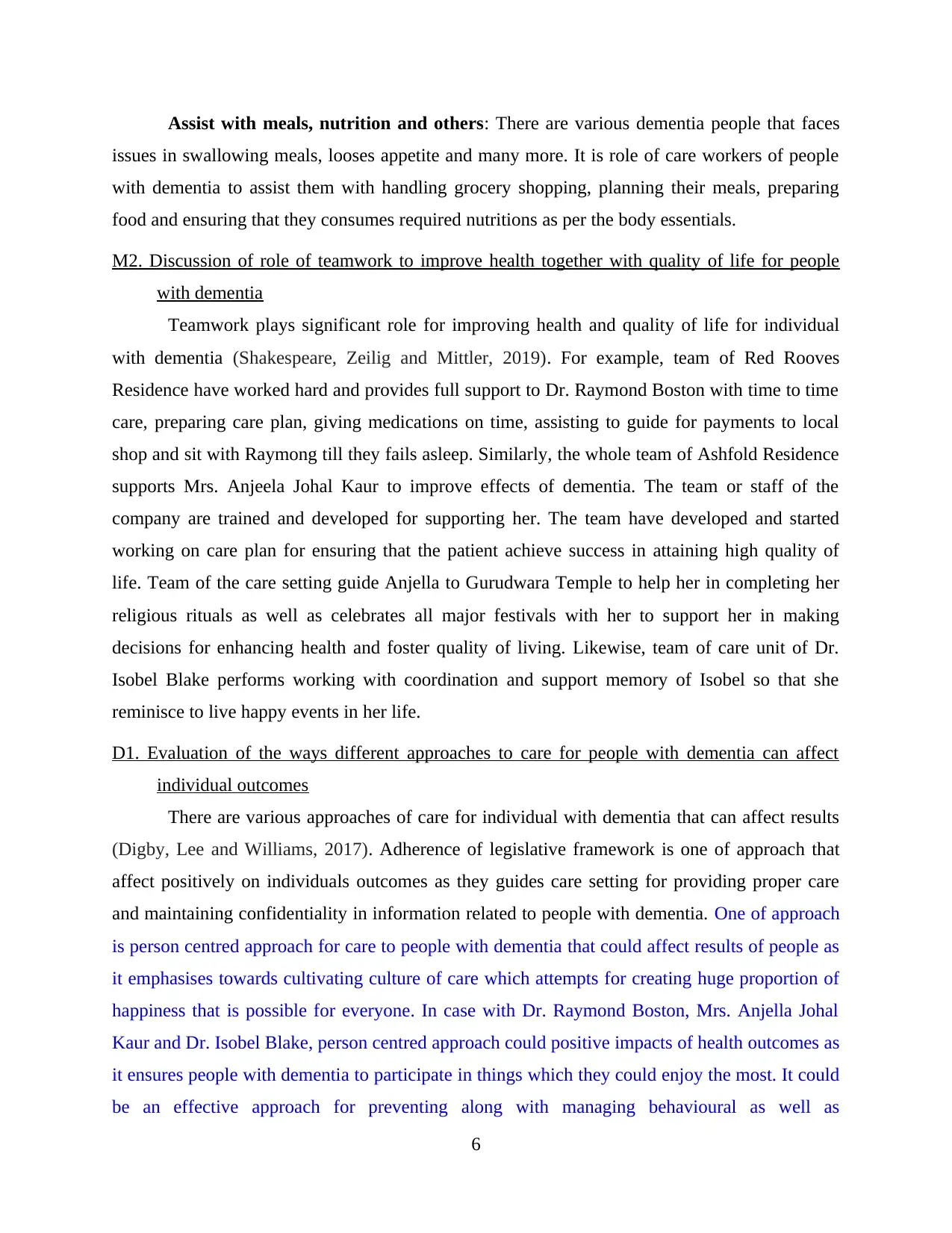
Assist with meals, nutrition and others: There are various dementia people that faces
issues in swallowing meals, looses appetite and many more. It is role of care workers of people
with dementia to assist them with handling grocery shopping, planning their meals, preparing
food and ensuring that they consumes required nutritions as per the body essentials.
M2. Discussion of role of teamwork to improve health together with quality of life for people
with dementia
Teamwork plays significant role for improving health and quality of life for individual
with dementia (Shakespeare, Zeilig and Mittler, 2019). For example, team of Red Rooves
Residence have worked hard and provides full support to Dr. Raymond Boston with time to time
care, preparing care plan, giving medications on time, assisting to guide for payments to local
shop and sit with Raymong till they fails asleep. Similarly, the whole team of Ashfold Residence
supports Mrs. Anjeela Johal Kaur to improve effects of dementia. The team or staff of the
company are trained and developed for supporting her. The team have developed and started
working on care plan for ensuring that the patient achieve success in attaining high quality of
life. Team of the care setting guide Anjella to Gurudwara Temple to help her in completing her
religious rituals as well as celebrates all major festivals with her to support her in making
decisions for enhancing health and foster quality of living. Likewise, team of care unit of Dr.
Isobel Blake performs working with coordination and support memory of Isobel so that she
reminisce to live happy events in her life.
D1. Evaluation of the ways different approaches to care for people with dementia can affect
individual outcomes
There are various approaches of care for individual with dementia that can affect results
(Digby, Lee and Williams, 2017). Adherence of legislative framework is one of approach that
affect positively on individuals outcomes as they guides care setting for providing proper care
and maintaining confidentiality in information related to people with dementia. One of approach
is person centred approach for care to people with dementia that could affect results of people as
it emphasises towards cultivating culture of care which attempts for creating huge proportion of
happiness that is possible for everyone. In case with Dr. Raymond Boston, Mrs. Anjella Johal
Kaur and Dr. Isobel Blake, person centred approach could positive impacts of health outcomes as
it ensures people with dementia to participate in things which they could enjoy the most. It could
be an effective approach for preventing along with managing behavioural as well as
6
issues in swallowing meals, looses appetite and many more. It is role of care workers of people
with dementia to assist them with handling grocery shopping, planning their meals, preparing
food and ensuring that they consumes required nutritions as per the body essentials.
M2. Discussion of role of teamwork to improve health together with quality of life for people
with dementia
Teamwork plays significant role for improving health and quality of life for individual
with dementia (Shakespeare, Zeilig and Mittler, 2019). For example, team of Red Rooves
Residence have worked hard and provides full support to Dr. Raymond Boston with time to time
care, preparing care plan, giving medications on time, assisting to guide for payments to local
shop and sit with Raymong till they fails asleep. Similarly, the whole team of Ashfold Residence
supports Mrs. Anjeela Johal Kaur to improve effects of dementia. The team or staff of the
company are trained and developed for supporting her. The team have developed and started
working on care plan for ensuring that the patient achieve success in attaining high quality of
life. Team of the care setting guide Anjella to Gurudwara Temple to help her in completing her
religious rituals as well as celebrates all major festivals with her to support her in making
decisions for enhancing health and foster quality of living. Likewise, team of care unit of Dr.
Isobel Blake performs working with coordination and support memory of Isobel so that she
reminisce to live happy events in her life.
D1. Evaluation of the ways different approaches to care for people with dementia can affect
individual outcomes
There are various approaches of care for individual with dementia that can affect results
(Digby, Lee and Williams, 2017). Adherence of legislative framework is one of approach that
affect positively on individuals outcomes as they guides care setting for providing proper care
and maintaining confidentiality in information related to people with dementia. One of approach
is person centred approach for care to people with dementia that could affect results of people as
it emphasises towards cultivating culture of care which attempts for creating huge proportion of
happiness that is possible for everyone. In case with Dr. Raymond Boston, Mrs. Anjella Johal
Kaur and Dr. Isobel Blake, person centred approach could positive impacts of health outcomes as
it ensures people with dementia to participate in things which they could enjoy the most. It could
be an effective approach for preventing along with managing behavioural as well as
6
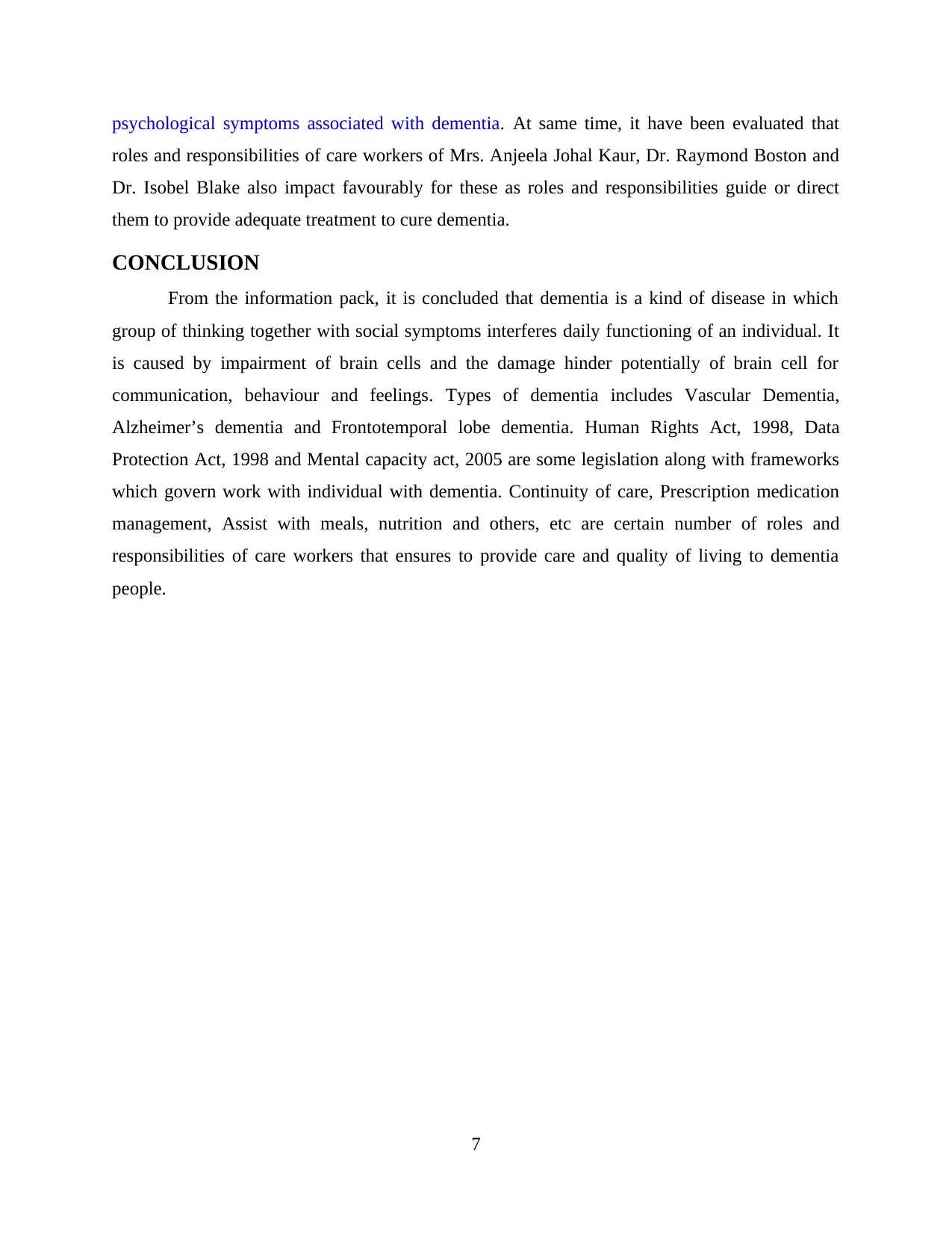
psychological symptoms associated with dementia. At same time, it have been evaluated that
roles and responsibilities of care workers of Mrs. Anjeela Johal Kaur, Dr. Raymond Boston and
Dr. Isobel Blake also impact favourably for these as roles and responsibilities guide or direct
them to provide adequate treatment to cure dementia.
CONCLUSION
From the information pack, it is concluded that dementia is a kind of disease in which
group of thinking together with social symptoms interferes daily functioning of an individual. It
is caused by impairment of brain cells and the damage hinder potentially of brain cell for
communication, behaviour and feelings. Types of dementia includes Vascular Dementia,
Alzheimer’s dementia and Frontotemporal lobe dementia. Human Rights Act, 1998, Data
Protection Act, 1998 and Mental capacity act, 2005 are some legislation along with frameworks
which govern work with individual with dementia. Continuity of care, Prescription medication
management, Assist with meals, nutrition and others, etc are certain number of roles and
responsibilities of care workers that ensures to provide care and quality of living to dementia
people.
7
roles and responsibilities of care workers of Mrs. Anjeela Johal Kaur, Dr. Raymond Boston and
Dr. Isobel Blake also impact favourably for these as roles and responsibilities guide or direct
them to provide adequate treatment to cure dementia.
CONCLUSION
From the information pack, it is concluded that dementia is a kind of disease in which
group of thinking together with social symptoms interferes daily functioning of an individual. It
is caused by impairment of brain cells and the damage hinder potentially of brain cell for
communication, behaviour and feelings. Types of dementia includes Vascular Dementia,
Alzheimer’s dementia and Frontotemporal lobe dementia. Human Rights Act, 1998, Data
Protection Act, 1998 and Mental capacity act, 2005 are some legislation along with frameworks
which govern work with individual with dementia. Continuity of care, Prescription medication
management, Assist with meals, nutrition and others, etc are certain number of roles and
responsibilities of care workers that ensures to provide care and quality of living to dementia
people.
7
Secure Best Marks with AI Grader
Need help grading? Try our AI Grader for instant feedback on your assignments.
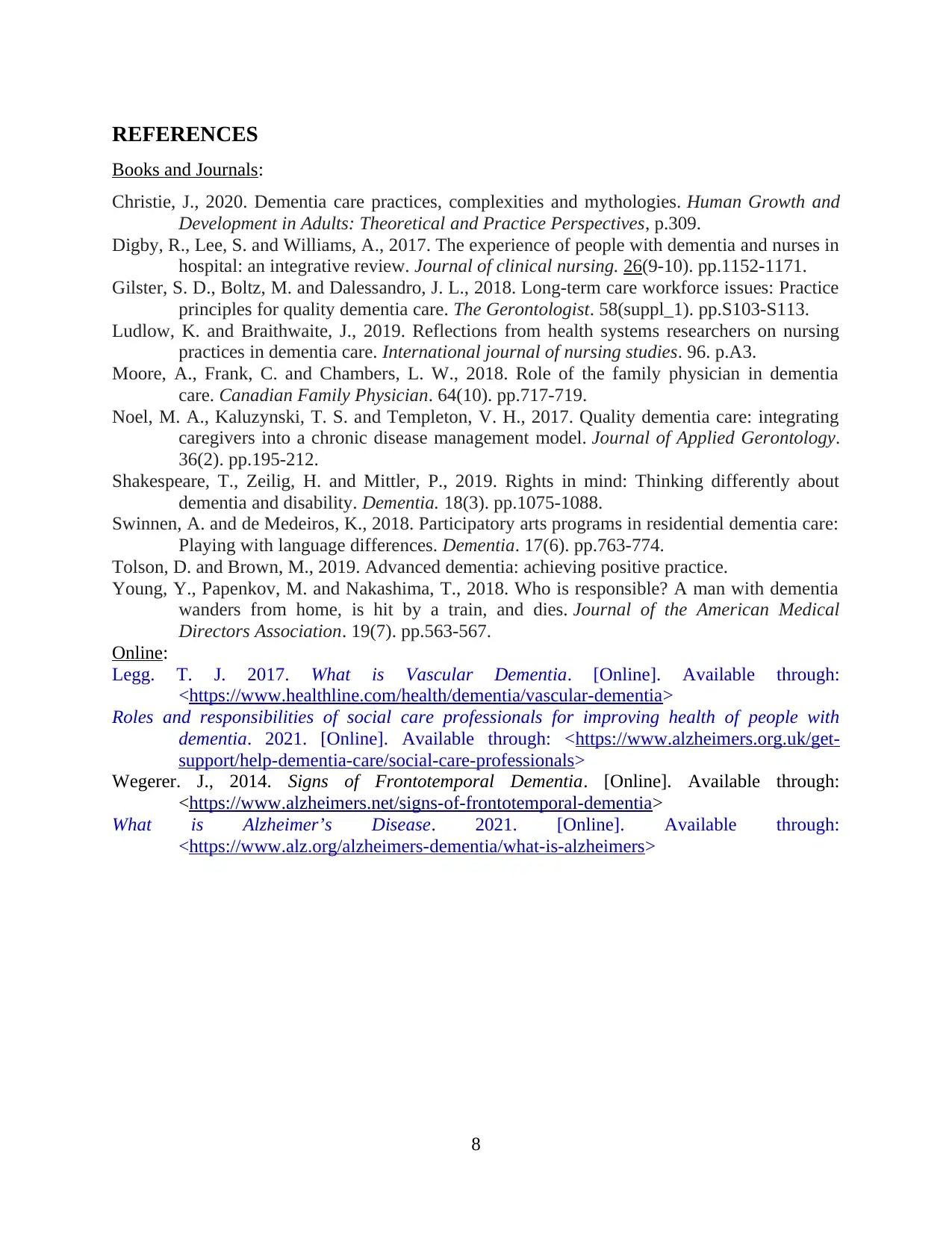
REFERENCES
Books and Journals:
Christie, J., 2020. Dementia care practices, complexities and mythologies. Human Growth and
Development in Adults: Theoretical and Practice Perspectives, p.309.
Digby, R., Lee, S. and Williams, A., 2017. The experience of people with dementia and nurses in
hospital: an integrative review. Journal of clinical nursing. 26(9-10). pp.1152-1171.
Gilster, S. D., Boltz, M. and Dalessandro, J. L., 2018. Long-term care workforce issues: Practice
principles for quality dementia care. The Gerontologist. 58(suppl_1). pp.S103-S113.
Ludlow, K. and Braithwaite, J., 2019. Reflections from health systems researchers on nursing
practices in dementia care. International journal of nursing studies. 96. p.A3.
Moore, A., Frank, C. and Chambers, L. W., 2018. Role of the family physician in dementia
care. Canadian Family Physician. 64(10). pp.717-719.
Noel, M. A., Kaluzynski, T. S. and Templeton, V. H., 2017. Quality dementia care: integrating
caregivers into a chronic disease management model. Journal of Applied Gerontology.
36(2). pp.195-212.
Shakespeare, T., Zeilig, H. and Mittler, P., 2019. Rights in mind: Thinking differently about
dementia and disability. Dementia. 18(3). pp.1075-1088.
Swinnen, A. and de Medeiros, K., 2018. Participatory arts programs in residential dementia care:
Playing with language differences. Dementia. 17(6). pp.763-774.
Tolson, D. and Brown, M., 2019. Advanced dementia: achieving positive practice.
Young, Y., Papenkov, M. and Nakashima, T., 2018. Who is responsible? A man with dementia
wanders from home, is hit by a train, and dies. Journal of the American Medical
Directors Association. 19(7). pp.563-567.
Online:
Legg. T. J. 2017. What is Vascular Dementia. [Online]. Available through:
<https://www.healthline.com/health/dementia/vascular-dementia>
Roles and responsibilities of social care professionals for improving health of people with
dementia. 2021. [Online]. Available through: <https://www.alzheimers.org.uk/get-
support/help-dementia-care/social-care-professionals>
Wegerer. J., 2014. Signs of Frontotemporal Dementia. [Online]. Available through:
<https://www.alzheimers.net/signs-of-frontotemporal-dementia>
What is Alzheimer’s Disease. 2021. [Online]. Available through:
<https://www.alz.org/alzheimers-dementia/what-is-alzheimers>
8
Books and Journals:
Christie, J., 2020. Dementia care practices, complexities and mythologies. Human Growth and
Development in Adults: Theoretical and Practice Perspectives, p.309.
Digby, R., Lee, S. and Williams, A., 2017. The experience of people with dementia and nurses in
hospital: an integrative review. Journal of clinical nursing. 26(9-10). pp.1152-1171.
Gilster, S. D., Boltz, M. and Dalessandro, J. L., 2018. Long-term care workforce issues: Practice
principles for quality dementia care. The Gerontologist. 58(suppl_1). pp.S103-S113.
Ludlow, K. and Braithwaite, J., 2019. Reflections from health systems researchers on nursing
practices in dementia care. International journal of nursing studies. 96. p.A3.
Moore, A., Frank, C. and Chambers, L. W., 2018. Role of the family physician in dementia
care. Canadian Family Physician. 64(10). pp.717-719.
Noel, M. A., Kaluzynski, T. S. and Templeton, V. H., 2017. Quality dementia care: integrating
caregivers into a chronic disease management model. Journal of Applied Gerontology.
36(2). pp.195-212.
Shakespeare, T., Zeilig, H. and Mittler, P., 2019. Rights in mind: Thinking differently about
dementia and disability. Dementia. 18(3). pp.1075-1088.
Swinnen, A. and de Medeiros, K., 2018. Participatory arts programs in residential dementia care:
Playing with language differences. Dementia. 17(6). pp.763-774.
Tolson, D. and Brown, M., 2019. Advanced dementia: achieving positive practice.
Young, Y., Papenkov, M. and Nakashima, T., 2018. Who is responsible? A man with dementia
wanders from home, is hit by a train, and dies. Journal of the American Medical
Directors Association. 19(7). pp.563-567.
Online:
Legg. T. J. 2017. What is Vascular Dementia. [Online]. Available through:
<https://www.healthline.com/health/dementia/vascular-dementia>
Roles and responsibilities of social care professionals for improving health of people with
dementia. 2021. [Online]. Available through: <https://www.alzheimers.org.uk/get-
support/help-dementia-care/social-care-professionals>
Wegerer. J., 2014. Signs of Frontotemporal Dementia. [Online]. Available through:
<https://www.alzheimers.net/signs-of-frontotemporal-dementia>
What is Alzheimer’s Disease. 2021. [Online]. Available through:
<https://www.alz.org/alzheimers-dementia/what-is-alzheimers>
8
1 out of 11
Related Documents
Your All-in-One AI-Powered Toolkit for Academic Success.
+13062052269
info@desklib.com
Available 24*7 on WhatsApp / Email
![[object Object]](/_next/static/media/star-bottom.7253800d.svg)
Unlock your academic potential
© 2024 | Zucol Services PVT LTD | All rights reserved.





